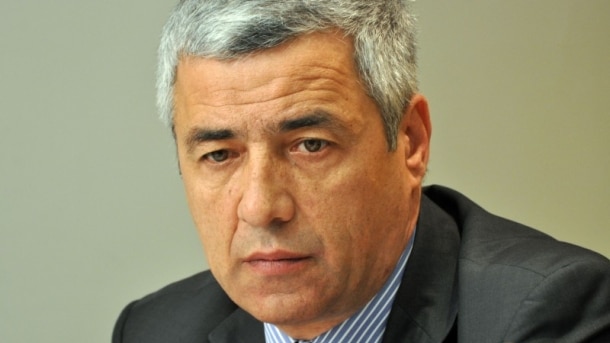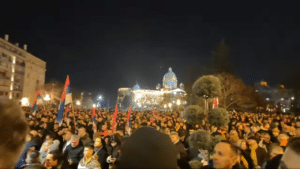Although Oliver Ivanovic had sought help of both the Kosovo and Serbian authorities out of fear for his life after receiving numerous threats, his efforts have proved to be in vain: On 16 January, the Kosovo Serb politician was shot dead in front of his party headquarters in the northern Kosovar city of Mitrovica. He died some hours later in the hospital. Kosovo, Serbia and the international community have condemned the killing. In response to Ivanovic’s death, Belgrade decided to suspend the EU-sponsored talks with Pristina until the perpetrators are found. The Kosovo Prime Minister Ramush Haradinaj alleged that the murder was ‘’the result of illegal involvement of other institutions beyond Kosovo’’, suggesting foreign involvement. Serbia’s request to conduct an investigation into the assassination was rejected by the Kosovo PM. Serbia’s President Aleksandar Vucic said he plans to visit Kosovo on 20 January.
Ignored threats
The head of the Serbia, Democracy, Justice (SDP) Civic Initiative had been threatened several times over the last few years. Last July, Ivanovic’s car was set on fire a few months before the local elections in Kosovo. He doubted whether the case would be investigated. ‘’I do not expect anything from the police, because so far nothing has been done in similar situations. Either it is a matter of incompetence, which I doubt, or a lack of courage to enter into conflict with the criminals and solve such cases,’’ he said at the time.
A similar incident occurred in 2005, when a bomb was planted under his car, which was parked in front of his house. Ahead of the local elections in September 2013, Ivanovic’s wife was assaulted at home. Ivanovic was then a mayoral candidate of Mitrovica. The same year, another person tried to set his office on fire. In none of these cases a perpetrator was found.
After all those incidents aimed at scaring him and his family, Ivanovic said that he might even be murdered. ‘’They did all they could to me, except shoot me – but even that is not excluded,’’ the politician said on a regional television channel in November. Ivanovic informed both the Serbian and Kosovo government about the threats he received. In addition, he sought help of the EU’s Rule of Law mission in Kosovo (EULEX), prosecutors, and the peacekeeping force KFOR. However, his calls for help were without any result.
‘’He was scared for his life, for the safety of his family, and he informed everyone about it – Serbia, Kosovo, the international community (…) Nobody can say they didn’t know,’’ said spokesperson for Ivanovic’s party, Ksenija Bozovic. However, according to Serbian President Aleksandar Vucic , the country’s security services had no knowledge regarding the existence of direct threats to Ivanovic.
Media reports said that Ivanovic was killed by more than one perpetrator. Police said they believe a burned-out car on another street in Mitrovica was used by the assailants.
National and international reactions
Both Belgrade and Kosovo have condemned the killing of the Kosovo Serb politician. Vucic declared the assault an act of terrorism and demanded that Serbia would be included in the investigations into Ivanovic’s death. Kosovo’s President Hashim Thaci called on the police to ‘’throw light as soon as possible on the circumstances of the death so that the perpetrators are brought to justice.’’ The Kosovo PM Haradinaj said he might involve the FBI to resolve the case. He also said Kosovo’s citizens should not be worried about the level of security in the country.
Thaci and Vucic met to discuss the murder case on 17 January. The Serbian President’s office said that Vucic had urged Thaci to accept the involvement of Serbian state institutions to conduct a probe into the assassination, which was declined by the Kosovo President. On Facebook Thaci wrote that both presidents had agreed to leave the investigation to competent bodies. ‘’President Thaci also stressed that the competent authorities of the Republic of Kosovo are ready to cooperate and accept any assistance that may lead to shed light on this murder in accordance with the legislation in force,’’ the statement further reads.
EU High Representative for Foreign Affairs and Security Policy Federica Mogherini urged Serbia and Kosovo ‘’to show calm and restraint’’ and said that the EULEX would support the probe into the murder case. Zahir Tanin, the head of the UN mission in Kosovo, called on judicial bodies to ‘’work swiftly and effectively.’’ US Ambassador to Pristina, Greg Delawie, endorsed Tanin’s call, urging ‘’all sides to avoid dangerous rhetoric and remain calm at this sensitive time.’’
On 19 January, Vucic announced that he plans to visit Kosovo a day later in what is widely seen by experts in Kosovo as a move to absolve himself from any blame and score some political points. The Kosovo authorities have given Vucic permission, but warned him to be respectful during his stay.
Politically motivated murder or mafia elements?
Ivanovic was deemed a moderate politician in Kosovo who advocated the co-existence of two ethnic groups in a country divided into two parts – a Serb-dominated minority to the north and an ethnic Albanian majority to the south. Ivanovic lived in the northern Kosovar city of Mitrovica, where the Ibar River divides ethnic Albanians to the south and ethnic Serbs to the north. The de facto partition of the town emerged in June 1999 after the NATO’s air campaign against Serbia, turning the city into a lawless territory. Following the end of the Kosovo war, Ivanovic was appointed head of the Serbian National Council of Kosovo and Metohija, a body set up to represent ethnic Serbs in Kosovo, which became independent from Serbia in 2008. Before he became head of the SDP Civic Initiative, Ivanovic had also served as a leader of the Democratic Party in Kosovo (PDK) until 2009. Furthermore, the politician was Serbia’s State Secretary of the Ministry for Kosovo and Metohija between 2008 and 2012. As one of the first Serbian politicians he travelled to Pristina and discussed solutions to practical issues with Albanian counterparts.
Ivanovic had also been considered a controversial person. He had been tried for war crimes against ethnic Albanians during the 1998-1999 war, when he was a leader of the Serb troops that fought against the Kosovo Liberation Army (KLA). Ivanovic’s arrest in 2014 led to protest by ethnic Serbs in Kosovo and strong objections in Belgrade. The Appeals Court annulled Ivanovic’s earlier verdict in February 2017, acquitting him on one charge while a retrial was under way. Ivanovic had always maintained his innocence, saying the criminal proceedings were politically motivated.
According to a report from Ivanovic’s press conference held after the car incident in 2017, the politician said there was one thing people did not like about him: his politics. Ivanovic was an opponent of Srpska Lista, which is currently part of Kosovo’s ruling coalition. According to Ivanovic, the party has been used by the Serbian government to influence politics in Kosovo. The leader of the SDP was also often at odds with Vucic, whose Serbian Progressive Party (SNS) came to power in 2012. After being side-lined following this power shift, Ivanovic continued to criticise Belgrade’s stance towards the Serbs in Kosovo. In his view, the Serbs in Kosovo should organise themselves without Serbia’s meddling.
Ivanovic was less involved in politics at the national level last year. It is therefore also possible that his death was not politically motivated, but related to criminal elements. Ivanovic himself warned about the absolute control of organised crime in North Kosovo and his city of Mitrovica – circumstances created by Vucic and the pro-SNS parties in Kosovo.
Putting the dialogue on hold
In response to Ivanovic’s death on 16 January, the Serbian delegation to the EU talks decided to withdraw from the technical meeting with Pristina planned that day in Brussels. The head of the Serbian government’s Office for Kosovo, Marko Djuric, said that Belgrade will no longer join the EU-led dialogue between the countries until the murderers are found. Some people believe the murder case is just an excuse for Serbia. According to Ahmet Isufi, the head of Kosovo PM Haradinaj’s parliamentary group, it is not the first time Belgrade had suspended the talks. ‘’This is the Serbian state’s way of behaving. The current representatives of the Serbian state are behaving in the same way [as former Serbian leader Slobodan Milosevic].’’
EU spokesperson Maja Kocijancic said that Ivanovic’s death was deplorable, but stressed the necessity to advance the dialogue between Serbia and Kosovo. She said, ‘’The EU is working with the two sides on resuming these meetings as soon as possible. The full implementation of agreements reached within the dialogue are obligations that both sides took and determine the speed of their advancements on the EU path.’’ The NATO also urged ‘’all parties to exercise restraint to defuse tensions’’ and called for dialogue between Belgrade and Pristina ‘’to continue as soon as possible (…) because this is critical for regional peace and security.’’ The head of the Kosovo delegation, Avni Arifi, emphasised the need to continue the talks as well, because ‘’there is no alternative to the dialogue.’’ He called on Serbia to re-join the negotiations as soon as possible.
Some experts fear for the future of the Brussels-led talks. Milan Antonijevic, from the Belgrade-based Lawyers’ Committee for Human Rights (YUCOM) said Ivanovic’s assassination should not be connected with the dialogue. ‘’Serbia’s decision to put the dialogue on hold is understandable, but is also impulsive (…) I don’t think Serbia should block what has been done so far [in the dialogue].’’ Dusan Janjic, director of the Belgrade-based Forum for Multi-ethnic Relations, said he hopes the suspension of the EU-talks is temporary. ‘’The crisis is guaranteed. Belgrade did not pass the first exam, by leaving the technical negotiations in Brussels.’’ However, according to Jeta Krasniqi, from the NGO Kosovo Democratic Institute (KDI), Ivanovic’s death should not affect the EU-talks aimed at the normalisation of the relations between Serbia and Kosovo in any way. ‘’Any attempt to turn back in this process will undermine efforts at stability and peace in the whole region,’’ she added.
Sources: Balkan Insight Balkan Insight I Radiofree Europe Radiofree Europe I Balkan Insight II Balkan Insight III Balkan Insight IV



